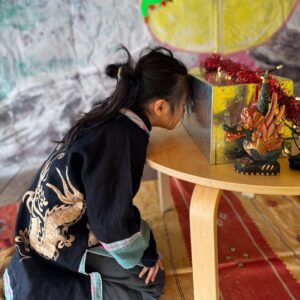Some Thoughts on Teaching About Mind
About This Resource
Details
In 2024, MWE commissioned educator Jackie Rushforth Mitchell to share her thoughts on teaching children about the mind. Dzongsar Khyentse Rinpoche has made statements to the effect that adults can point out the mind to children, asking them where the mind dwells, and so on. We wanted to discuss this practice from a developmental point of view and in Jackie’s, we found a thoughtful balance between following this suggestion to a word, and treading carefully.
In this article, Jackie walks the reader through three main developmental stages of children, and discusses which dharma topics are most developmentally appropriate for these very different stages. She also discusses some of the risks and opportunities of different approaches to the mind. This article offers a guide for parents and educators seeking to teach the dharma with the most effective methods to inspire and support children as they naturally learn and evolve.
Jackie Rushforth Mitchell was a founding member of the Shambhala School in Halifax, Nova Scotia, where she taught early elementary classes for 20 years. She has undergraduate degrees in sociology and dance therapy and a masters in curriculum development. She supported the curriculum design at Lhomon Education. Originally from Scotland, she has lived in France, Portugal, the USA, and spent most of her adult life in Canada. She has two grown children and a lifelong passion for education as a vehicle for transformation.
Some Thoughts on Teaching About Mind from a Child Development Perspective
Since our current education with its focus on degrees and jobs transmits values like competition, individualism, and materialism, our new education has no choice but to emphasize more human values like confidence, kindness, resilience, creativity and authenticity. – Dzongsar Jamyang Khyentse
Dzongsar Khyentse Jamyang Rinpoche, in the Compilation of Remarks on Education, redefines the goals of education from a Buddhist perspective, challenging the values of the current Western education, with an emphasis on teaching children about the mind. As a teacher who aligns my aspirations for an education system as described by Dzongsar Jamyang Khyentse Rinpoche (henceforth referred to as Rinpoche throughout), I would like to offer some thoughts on the importance of understanding child development as we introduce children to the mind. I taught at the Shambhala School in Halifax for more than 20 years, and although the school is not explicitly Buddhist, the underpinnings of the curriculum and pedagogy is Buddhist in its view and approach. Early on, many of the teachers were students of Chogyam Trungpa and were Buddhist practitioners, who wished for the outcomes for their students described by Rinpoche in his vision for education.
In the middle and high school years meditation and mindfulness are introduced formally through short periods of sitting practice. In the elementary years, particularly the early elementary years, the path to awakening an understanding of mind in the children was informed through the lens of child development. Developmental theory indicates that young children are not able to integrate concepts outside of a context that anchors them in the reality of their environment and experience. From both an experiential and a theoretical point of view the teachers saw that a conceptual approach that included questioning younger children about their experience had the effect of dis-integrating them, promoting self-consciousness, separating head from heart, and putting them at one remove from their environment. As Rinpoche says, “We have to be really careful children do not


